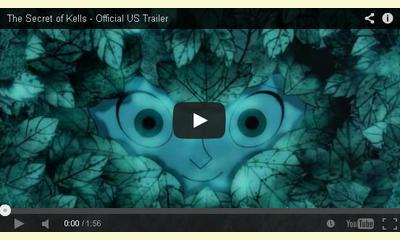|
|
Beyond Classic Disney: 5 Great Animated Kids' Films Without the Racial Stereotypes
un article par Christopher Zumski Finke, Yes! Magazine
Video: The Secret of Kells
This week, actress Meryl Streep presented an award
to Emma Thompson for her performance as P.L
Travers, the author of Mary Poppins, in the recent
film Saving Mr. Banks. During her effusive praise
for Thompson, Streep also took the opportunity to
remind the world of Walt Disney's personal flaws,
calling Disney a "gender bigot" and "supporter of
anti-Semitic industry lobbying groups."

The Secret of Kells - Official US trailer
click on photo to enlarge
When we can converse about why "What Makes the Red
Man Red" is offensive, then he's probably old
enough to watch it.
Disney's view of women and minorities isn't news—
both his reputation and the classic films his
studio has produced in the last century have long
courted controversy. But Streep's words offer an
important reminder of how easily we can forget to
look critically at films we love.
Take the Disney animated film Peter Pan. When I
was a child, it inspired my imagination to no end.
A magical land with eternal childhood and sword
fights and battles against Captain Hook. My
nostalgia for Peter Pan remains strong and I
fondly recall my days of reveling in its story.
But I don't think I'll share Peter Pan with my son
anytime soon. It's just too racist. That may seem
extreme to some, but provided one maintains a
commitment to equality and respect for diversity,
Peter Pan is very difficult to watch today.
Children are affected by movies in a way that's
easy to forget as an adult, and as a father I
don't want to my son's young imagination to be
captured by the stereotypes about race, gender,
and culture found in Peter Pan, The Little
Mermaid, or other Disney classic animated movies.
Which isn't to imply these films are without
merit. With context and history and the capacity
to think critically, many of Disney's classic
animated films remain enjoyable and moving. But we
should not deny that our society's progress toward
equality over the past century has complicated
many of the stories we previously held dear. As we
progress through history, so too do our tastes.
Maybe when he's older, and able to add context to
what he's seeing, my son and I will watch Peter
Pan and talk about Native American representations
in film over the past century. When we can
converse about why the song "What Makes the Red
Man Red" is offensive, then he's probably old
enough to watch it. But until then, I'm keeping
him off the old-school Disney train.
Lucky for my son, there's a world of magnificent
animated cinema that's been created in recent
decades. Movies built on stories of magic and
delight. Movies that do not pander to children,
underestimate their intelligence, or strip
characters down to stereotypes. If holding off on
the Disney classics for a few years means that
we'll engage in a much more diverse array of
cinema, then that's a sacrifice I'm comfortable
making.
Here are five Disney films that have found
controversy over the years, and five films to
consider in their place.
[Note: Thank you to Janet Hudgins, the CPNN
reporter for this article].
(This article is continued in the discussionboard)
|








|
DISCUSSION
Il n'y pas encore de question liée à cet article.
* * * * *
Commentaire le plus récent:
(The following is continued from the main article listed above.)
Here are five Disney films that have found controversy over the years, and five films to consider in their place.
1. Replace Fantasia (1940) with The Secret of Kells (2009)
Featuring eight musical vignettes telling eight separate stories, Fantasia is best known today or a segment called "The Sorcerer's Apprentice," in which Mickey Mouse creates magic beyond his capacity to control.
But it was another segment that has caused controversy over the years. In "The Pastoral Symphony," Beethoven's music is accompanied by a panoply of Greek mythological figures gathered for the festival of Bacchus. Among those in attendance are a group of white centaurs being attended to by a black centaur, portrayed in pickaninny fashion, who is clearly their servant.
The scene was deleted from the film before the 1969 theatrical rerelease. For a time Disney denied the scene had ever existed. Erasing our dubious artistic creations is rarely a solution to be praised. But as film critic Roger Ebert rightly stated, "there is no need for the general release version to perpetrate racist stereotypes in a film designed primarily for children."
We don't always have to leave Disney to find excellent alternatives to the studio's troubled past.
Fantasia does offer a rare animated experience, but it is not alone in that regard. Equally enchanting is the Irish/Belgian film The Secret of Kells. . ... continuation.

|
|









